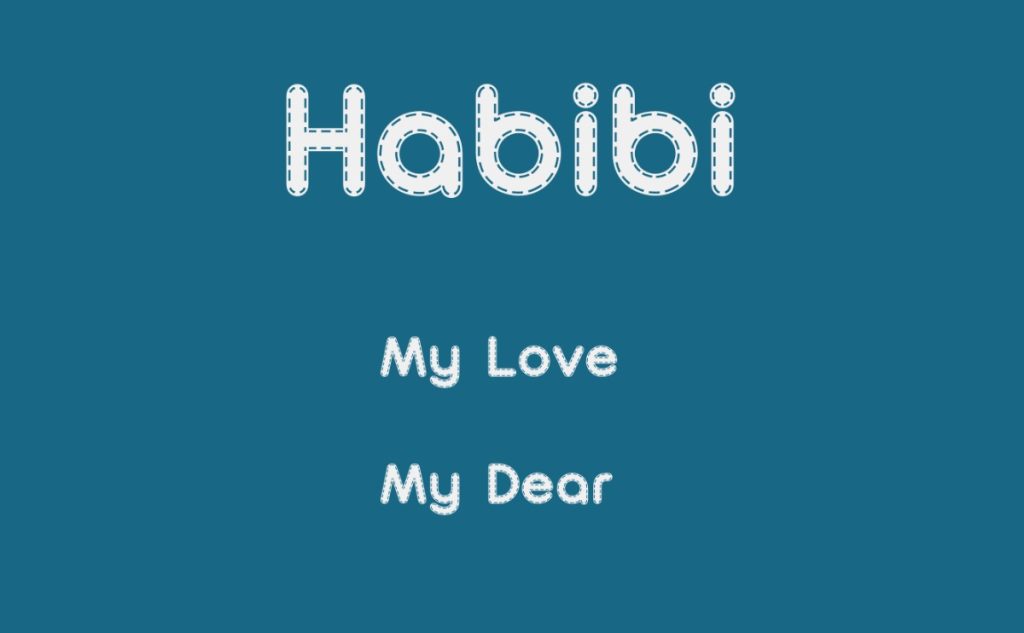“Habibi” is an Arabic word you’ll often hear in the UAE and throughout the Arab world. When I was travelling through Dubai, I heard it in bustling markets, cozy cafés, and even from a taxi driver sharing stories about his city.
It’s a word that feels like a warm embrace, which can instantly make conversations feel closer. But what does Habibi mean? How do you use it? And who can you say it to?
What Does Habibi Mean?
At its core, Habibi means “my love” or “my dear.” It’s a term of endearment, used to express affection or closeness. The root word, habib, means “beloved” or “loved one.” Adding the “i” at the end makes it personal, like saying “my beloved.”
Arabic is a language that loves to express feelings. Habibi is one of those words that carries a lot of heart. You might hear it in a romantic song or between friends and colleagues joking around. It’s versatile, which fits into many moments of life.
For me, it’s like a verbal smile that can make a conversation feel warmer.
The Cultural Roots of Habibi
Arabic culture values connection and hospitality. Words like Habibi reflect this. They’re not just words; they’re a way to build bonds. In many Arab countries, people use Habibi to make others feel special or valued.
It’s common in places like Egypt, Lebanon, and the Gulf countries, but its use spreads far beyond. Thanks to Arabic music and movies, Habibi has traveled the world.
When I visited Jordan, I noticed how shopkeepers called customers Habibi to create a friendly vibe. It wasn’t fake; it felt natural, like they genuinely cared. That’s the magic of Habibi. It bridges gaps between strangers, friends, and lovers.
Who Can You Call Habibi?
One of the best things about Habibi is how flexible it is. You can use it with almost anyone, but the meaning shifts depending on who you’re talking to. Below, I’ll break down the main groups you can call Habibi and how it feels in each case.
Romantic Partners
When you say Habibi to a boyfriend, girlfriend, husband, or wife, it’s deeply romantic. It’s like saying “honey” or “sweetheart” in English. The word drips with love and intimacy. For example, you might say, “Habibi, let’s go for a walk,” and it instantly feels tender.
In this romantic context, Habibi is similar to English words like:
- Darling: A sweet, old-fashioned term for a loved one.
- Baby: A casual, modern way to indicate affection.
- Sweetie: A gentle, caring word for someone you love.
I remember hearing a couple in a Beirut café call each other Habibi while sharing dessert. It was so natural, like the word was made for moments like that. But be careful, if you use Habibi romantically with someone you’re not close to, it might feel too forward.
Friends and Family
Habibi isn’t just for romance. You can also use it with close friends or family members. Between friends, it’s like saying “buddy” or “pal” in English, but with more heart. With family, it’s a way to express love, like calling your mom “dear” or your brother “little one.”
For example, you might say to a friend, “Habibi, you’re late again!” with a laugh. Or to a younger sibling, “Come here, Habibi, let me help you.” In these cases, Habibi feels playful or protective.
Words similar to Habibi in this context include:
- Buddy: A casual, friendly term in English.
- Mate: Common in British or Australian English for a friend.
- Dear: Used for family, like saying “my dear daughter.”
When I call my best friend Habibi, it’s our way of saying, “You’re like family.” It’s a small word that carries a big sense of trust.
Strangers or Acquaintances
Surprisingly, you can even use Habibi with people you don’t know well, like shopkeepers or taxi drivers. In this case, it’s less about deep affection and more about creating a friendly vibe. It’s common in Arab cultures to use Habibi to make conversations feel welcoming.
For instance, a waiter might say, “Here’s your coffee, Habibi,” with a smile. It’s not romantic or overly personal. It’s just a way to be kind. In this situation, Habibi is like:
- Friend: A casual English term to make someone feel at ease.
- Mate: Again, a friendly word in some English-speaking cultures.
- Sir/Ma’am: Polite but less formal than these terms.
How to Use Habibi in Different Situations
Now that we know who you can call Habibi, let’s talk about when and how to use it. I’ll give you some common scenarios, along with tips to get it right.
In Romantic Moments
Using Habibi in a romantic setting is all about emotion. It’s perfect for quiet moments, like telling your partner, “Habibi, you mean the world to me.” The word feels soft and sincere, so that it is ideal for love letters, sweet texts, or heartfelt talks.
To use it well:
- Pair Habibi with kind words, like “Habibi, you make me so happy.”
- Use a gentle tone to match the word’s warmth.
- Avoid overusing it, so it stays special.
Similar words in this scenario are “darling,” “love,” or “baby.” For me, writing Habibi in a birthday card to my partner feels like wrapping them in a warm blanket of words. As most probably it will be
In Casual Conversations with Friends
With friends, Habibi is fun and light. You might tease a friend by saying, “Habibi, you owe me lunch!” or cheer them up with, “Don’t worry, Habibi, you’ve got this.” It’s a way to express you care without being too serious.
To make it work:
- Use Habibi in a playful or supportive tone.
- Match the vibe of the conversation—don’t force it in serious moments.
- Be sure your friend is comfortable with terms of endearment.
Words like “buddy,” “pal,” or “mate” are close matches here. I love tossing Habibi into group chats with my friends and it always gets a smile.
In Public or Service Settings
When using Habibi with strangers, like in a market or café, keep it friendly but not too personal. For example, you might say, “Thanks, Habibi!” to a vendor who hands you your order. It’s a way to show appreciation and keep the interaction warm.
Tips for this setting:
- Smile when you say Habibi to match its friendly vibe.
- Use it in casual, informal places like markets or small shops.
- Avoid it in formal settings, like offices or banks, where it might feel odd.
In these moments, Habibi is like saying “friend” or “mate.” I’ve found that using Habibi at a street food stall often leads to a bigger portion and a grin from the vendor!
Habibi’s Feminine Form: Habibti
Habibti is the feminine version of Habibi. Arabic nouns often change based on gender, and Habibi is no exception. Habibi is used for males, while Habibti is for females. The meaning stays the same: “my love” or “my dear”. But the ending changes to match the person’s gender.
For example:
- To a man: “Habibi, let’s grab coffee.”
- To a woman: “Habibti, you look amazing today.”
You can use Habibti in all the same situations as Habibi—with romantic partners, friends, or even strangers. The similar words (darling, buddy, friend) apply to Habibti too. When I call my sister Habibti, it feels like a little gift of love, and she always lights up.
Common Mistakes to Avoid
While Habibi is easy to use, there are a few pitfalls to watch out for. Here’s how to avoid them.
Use It in Formal Settings
Habibi is warm and casual, so it doesn’t fit in serious or professional places. Calling your boss or a government official Habibi might come off as disrespectful. Stick to informal settings like social gatherings or casual shops.
Misjudge the Relationship
If you call someone Habibi too soon, especially in a romantic way, it might feel too intense. For example, saying Habibi to someone you just met on a date could make them uncomfortable. Build some trust first.
Forget Cultural Context
In some Arab cultures, Habibi is super common, but in others, it’s less used with strangers. If you’re traveling, pay attention to how locals use it. When I was in Morocco, I noticed Habibi was less common in formal shops than in Egypt, so I adjusted how I used it.
Habibi in Pop Culture
You’ve probably heard Habibi in songs, movies, or TV shows. It’s a star in Arabic pop culture and beyond. Singers like Amr Diab and Nancy Ajram sprinkle Habibi into their lyrics, which makes their songs feel personal and emotional. In movies, characters use Habibi to flirt, comfort, or tease.
For example, in the song Habibi Ya Nour El Ain by Amr Diab, Habibi is a romantic cry to a beloved. Listening to it always makes me feel like I’m in love, even if I’m just doing dishes! In Hollywood, Habibi sometimes pops up in films set in the Middle East, though it’s often used in a cliché way.
Thanks to social media, Habibi has gone global. On platforms like TikTok, people use it in funny videos or heartfelt posts. It’s a word that connects cultures, and I love seeing non-Arabs embrace it with joy.
Similar Words in Other Languages
Here are more words from various languages that carry the same warmth and affection as “habibi”:
- Spanish: Cariño – Means “darling” or “honey,” used for loved ones or friends.
- French: Mon chéri – Means “my dear,” perfect for romantic or close relationships.
- Hindi: Jaan – Means “life,” a sweet term for someone you cherish.
- Italian: Amore – Means “love,” used for romantic partners or dear ones.
- Portuguese: Querido/a – Means “dear” or “beloved,” suitable for close friends or family.
- Turkish: Canım – Means “my soul” or “my dear,” a tender term for loved ones.
- German: Schatz – Means “treasure,” commonly used for partners or children.
- Russian: Милый/Милая (Milyy/Milaya) – Means “darling” or “sweetie,” used for loved ones.
- Swahili: Mpenzi – Means “beloved” or “sweetheart,” often used romantically.
- Japanese: 愛しい (Itoshii) – Means “beloved” or “dear,” expressing deep affection.
- Korean: 자기 (Jagi) – Means “honey” or “darling,” common among couples.
Each of these words, like Habibi, is a small way to make someone feel special.
Wrap Up
Habibi is more than a word, it’s a feeling. It’s about love, friendship, and kindness. Whether you’re saying it to a partner, a friend, or a stranger, Habibi builds a bridge between hearts. In a world that can feel cold, Habibi is like a warm cup of tea, reminding us to stay connected.
For me, Habibi is a reminder of the beauty of Arabic culture and its focus on relationships. Every time I say it, I feel a little closer to the people around me.




